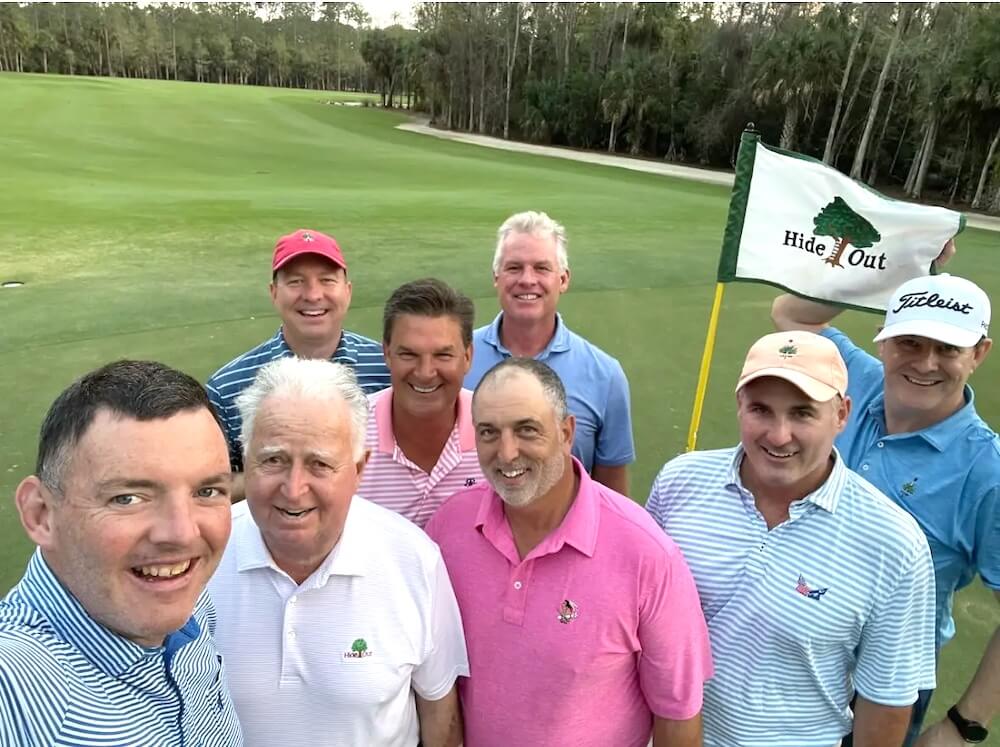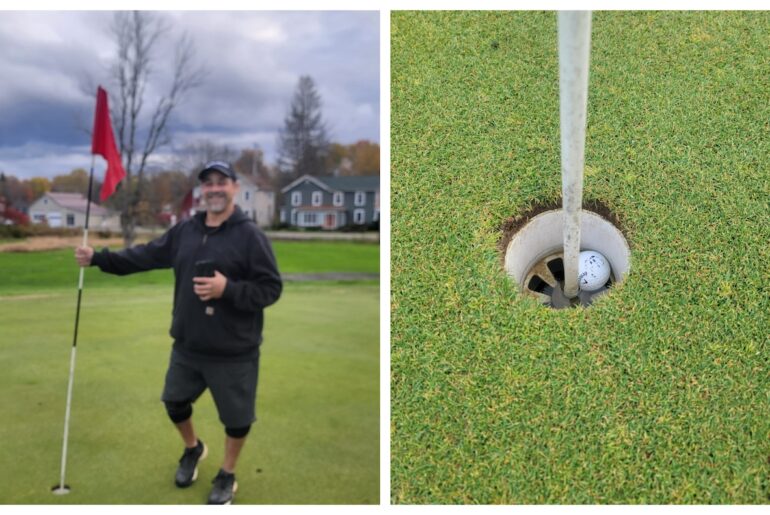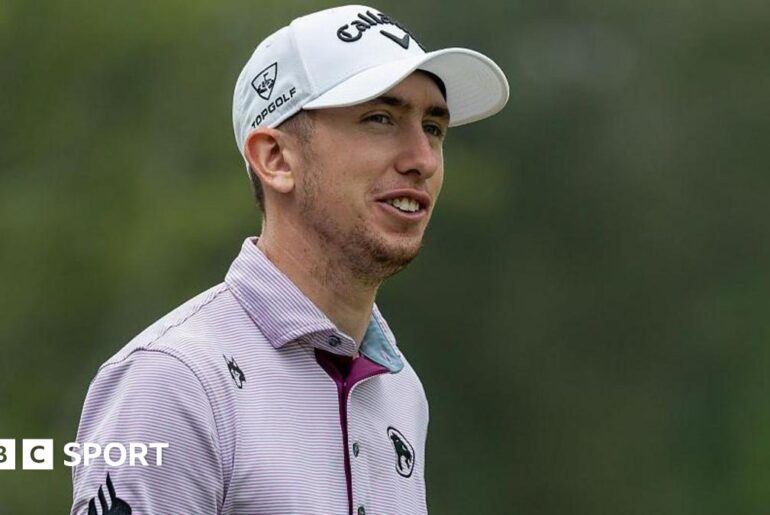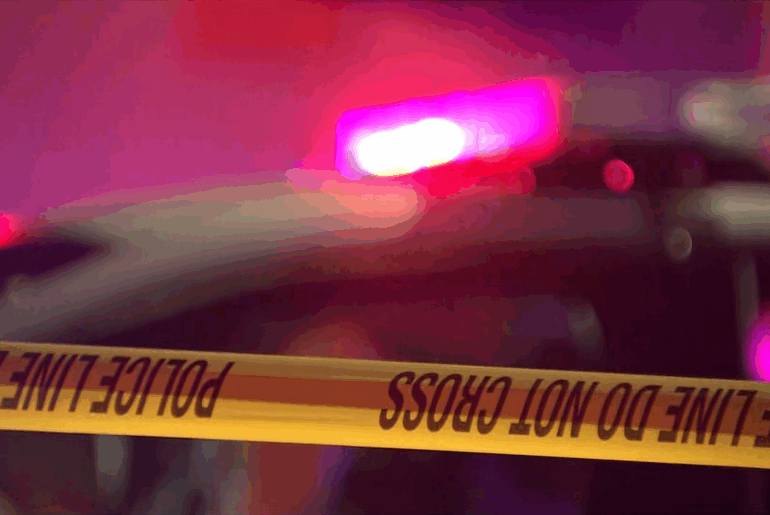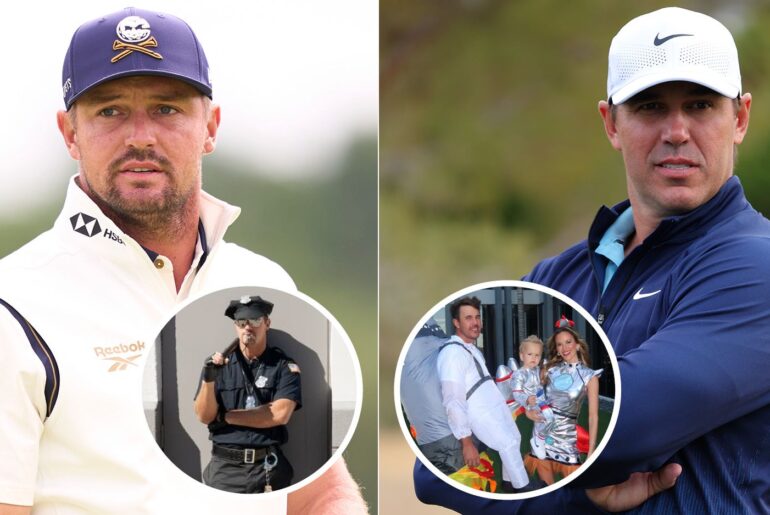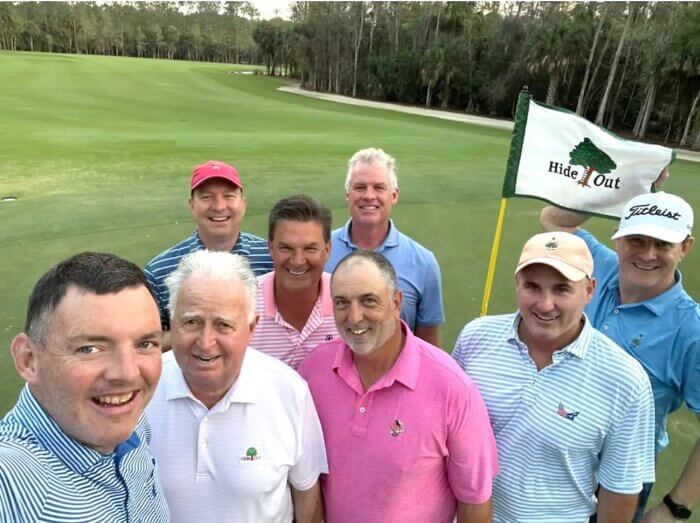 Many members of the Wilson-Smith Golf League credit the group with improving their lives. Pictured here are (front, from left) Ed C., Ned M. Sr., Ned M. Jr., Brendan K., Brendan C. and (back, from left) Michael M., Andy M. and John F.
Many members of the Wilson-Smith Golf League credit the group with improving their lives. Pictured here are (front, from left) Ed C., Ned M. Sr., Ned M. Jr., Brendan K., Brendan C. and (back, from left) Michael M., Andy M. and John F.
On a steamy afternoon at the end of summer, two foursomes from the Wilson-Smith Golf League are playing a friendly match at Philadelphia’s historic Overbrook Golf Club.
The stakes may be modest – each player tossed a few bucks into the pot – but the competitive spirit is strong among this unique group of golfers, all of whom have been to the edge of the abyss and come back stronger.
“Golf is our way of celebrating life renewed,” provides Casey D., a physically fit building contractor in his middle 60s and one of the league’s founding members. “Competing against your buddies in a golf match is one of the most fun things in life, which makes what we have in common all the more special.”
What members of the Wilson-Smith Golf League share is a fellowship based on the bonds of friendship and sobriety.
The league is named in honor of a pair of visionary fellows named Wilson and Smith who established their lifesaving recovery program in 1935, providing a pathway for untold millions back to sobriety.
But for members of Wilson-Smith, the game of golf provides a healthy way to fuel the competitive spirit within and forge meaningful friendships based on shared sobriety and a passion for the game.

Every member has his own winding journey to tell from darkness to light. Some are recovering alcoholics, others were hooked on drugs or addicted to other dangerous substances. There is no judgment within this unique brotherhood, though a year of sobriety is essential for membership. Most find their way to the league through a sponsor or friends who have experienced the league’s healing powers of fellowship.
My cart partner this day, Andrew A., took his first drink at age 8, a beer stolen from his grandfather’s work shed. He liked the taste and the buzz it gave him. Never much of a student, he began drinking seriously in the sixth grade and dropped out of school a year later. “Skateboarding, smoking weed and drinking beer was my thing for a long time,” he recounts with a grim smile. “I loved golf and even discovered that I could play golf drunk. Unfortunately, I became a blackout drinker, the village drunk. Something had to change, or I wouldn’t have survived.”
Following a weekend bender as a guest at a buddy’s golf club event, he realized that he’d finally had enough. “I phoned a friend in Florida who was part of an addiction recovery support group, and he invited me to hop on one of their regular Zoom meetings. This was at the start of COVID. I listened to what everyone on the Zoom had to say and related to every one of their stories. It was a real life-changing moment because I have a wife and two young daughters and realized that something seriously had to change. As you’ll hear many members say, I was the last one to find out that I was an alcoholic.”
Andrew has been sober for five years, a successful real estate broker who was introduced to the league by Casey D., who got sober 43 years ago when he met Peter H., the founder of the Wilson-Smith Golf League, at a recovery meeting.
“The golf is great. But whether you win or lose, the real payoff is the fantastic friendships you make in this league, guys that are genuine and caring. The competition is fierce, but so is the fellowship and love we have for each other.” – Mark T.
Today Casey and Peter are partners in the league’s two-man team best-ball matches that begin with a lively tee-off dinner at Overbrook in the spring (where members greet each other with robust bear hugs worthy of a fraternity reunion) and run through mid-autumn. The season finale features flighted team playoffs in two divisions with a championship match staged at a leading private club in the region. Members pay a $300 annual fee for dues, which covers the cost of events, the championship trophy, and the league’s ever-expanding website. Whatever funds are left have been distributed to local charities that support sobriety and caddie scholarships, but are now applied to helping the league expand nationally.
“The golf is great. But whether you win or lose, the real payoff,” says Mark T., owner of a major sportswear company in his sixth year of membership, “is the fantastic friendships you make in this league, guys that are genuine and caring. The competition is fierce, but so is the fellowship and love we have for each other.”
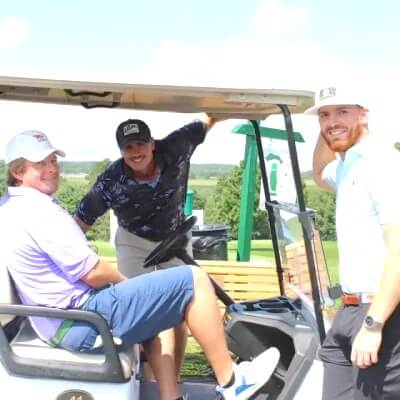 Chris S. (left), Ben C. and Shane D. of the Wilson-Smith Golf League
Chris S. (left), Ben C. and Shane D. of the Wilson-Smith Golf League
By design, at least one member of a team must have a membership at a private club, which allows league members to compete at some of the most revered private layouts around Philly and the surrounding region. Members are required to play four competitive matches per season, one at home and one away, plus pay their own guest fees. The site of this year’s season-closing championship was Saucon Valley Country Club in Bethlehem, Pennsylvania, host of eight USGA championships including the 2022 U.S. Senior Open.
The league hosts its annual tee-off banquet at Overbrook, founded in 1900 and originally designed by Donald Ross. The club relocated after World War II and now boasts a spectacular layout built by Ross’ chief design associate, J.B. McGovern, over 128 acres of rolling hills west of Philadelphia. Overbrook’s clubhouse is a Golden Age mansion almost within sight of the estate that inspired the 1940 hit comedy “The Philadelphia Story” with Kate Hepburn and Jimmy Stewart. Another interesting tidbit is that Overbook was among the first major club courses to be revised by popular young architect Andrew Green.
“We get to play some incredible golf courses,” declares Andrew A. as he hops back in the cart after crushing a drive on Overbrook’s gorgeous fifth hole. “But something about Overbrook makes us feel right at home. Addiction destroys your self-esteem, and recovery never stops. That’s why the joy of playing this game with a brotherhood of guys who know who you are and what you’ve been through, is so important. Thanks to my recovery and friends in the league, my wife and daughters finally have the father they deserve. Without question, this saved my life.”
“That’s something you’ll often hear members of the league say,” acknowledges Peter H. “It’s a little overwhelming to hear, but it comes from the heart. All of us feel this belief.”
• • •
Founder Peter H.’s own story is emblematic of the long journey his fellow league members have all made from alcohol or substance addiction to sobriety – aided by the power of golf and friendship.
He grew up on Long Island, the third of seven kids in a large Catholic family, and had his first taste of alcohol at 13. “I liked it,” he says. “It filled a hole and for the first time in my life I felt normal and that I fit in.”
At 16 he dropped out of a Catholic boys school to attend public school and took a part-time job washing dishes at a local restaurant. Ambitious and bright, he had dreams of becoming a journalist or perhaps a TV anchor, and eventually paid his way through college working as a short-order cook and night-time bartender, earning a journalism degree from Hofstra University in the process.
“Tending bar was a great job. I had the kind of people personality that could keep the customers happy, and my own drinking on a level I thought I could handle. When I graduated in 1980, I was making a thousand dollars a week and living on the beach on Long Island, but didn’t have two nickels to rub together.
“I saw the counselor who promptly informed me that I was an alcoholic and drug addict. By then I was basically ‘couch-surfing,’ a failure at the business of life, and even felt suicidal. … Fortunately, my counselor told me I needed to go through detox and rehab followed by an ongoing recovery program. I finally understood that alcohol and drugs were my problem and I got help.” – Peter H.
Little by little, he adds, as his drinking increased his dreams began to slip away. “I enrolled in a graduate program at New York University but realized I couldn’t keep up with the work, so I dropped out. It was the start of a serious downward trajectory, but I didn’t realize it at the time. I was not a falling-down drunk, mind you. I was quite functional, but that was part of the problem. I believed I could handle the booze.”
During this time, Peter got engaged, but he broke things off six months before the wedding – knowing that something was wrong with himself. Due to the upheaval he caused, his ex-fiancée gave him the business card of a counselor she believed could help him face up to his growing problem.
“I saw the counselor who promptly informed me that I was an alcoholic and drug addict. By then I was basically ‘couch-surfing,’ a failure at the business of life, and even felt suicidal. That’s pretty common among alcoholics, by the way, a self-loathing that feels hopeless. Fortunately, my counselor told me I needed to go through detox and rehab followed by an ongoing recovery program. I finally understood that alcohol and drugs were my problem and I got help.”
After spending five days in a detox program at a local hospital, Peter quit his bartending job, borrowed $700 from his mom and entered a rehabilitation facility.
With the help of his supportive recovery group, which included 90 meetings over 90 days, he began to slowly take charge of his life. After nine months of sobriety and working part-time jobs selling satellite antennas, waiting tables and cleaning toilets, he eventually found a “real job” with a public relations agency and eventually returned to graduate school before settling into the facility maintenance industry. As his recovery gained momentum, he built a highly successful business as an independent industrial manufacturer’s representative.
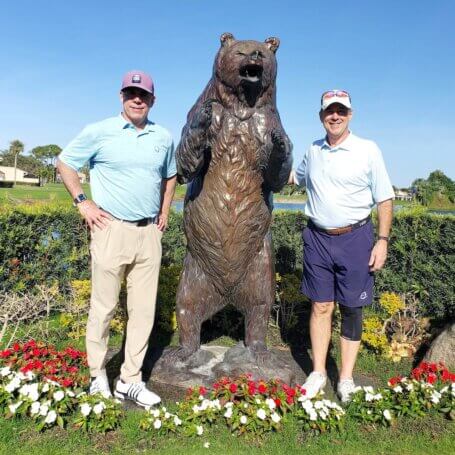 John H. (left) and Peter H. on the day they played the Bear Trap at PGA National
John H. (left) and Peter H. on the day they played the Bear Trap at PGA National
Five years into his sobriety, he met a beautiful woman named Susan during his daily commute at Penn Station. “She took my card and three months later we went on our first date,” he says. The pair eventually married. “Meeting my wife was the best thing that ever happened to me,” he explains with emotion. “She has been the rock in my life, the reward for finally getting sober and enjoying the successful life we have today.”
At age 43, Peter’s business mentor suggested he take up golf to help grow his business. “So, I borrowed, and later purchased, some clubs and joined Overbook and took some lessons and started playing as the extra in a group of eight guys at a local public club on weekends,” he explains.
“What started out as business golf soon became something much more important. A lot of the guys I played with in those days were in recovery themselves and became good friends. At first, I was the fill-in guy on weekends who was available if one of the regulars failed to show up. But soon I was one of the regulars.”
Golf, he adds, provided the kind of healthy sports activity that appealed to his competitive nature as well as a unique friendship with guys who completely understood the challenging road he’d traveled back to sobriety. A few years ago, Peter received his 40-year medallion celebrating his sobriety.
“This game is so powerful. It’s taught me patience and perseverance – how to overcome challenges on the course as well as in life. In essence, I learned to embrace the game of golf with all its unexpected ups and downs, bad breaks and lucky bounces. In that way, golf is very much like the game of life in which you grow and change. Sobriety is essential for that growth.”
With this kind of insight, as Peter’s golf skills improved, an intriguing idea came to him to propose the casual formation of a small “league” of 12 guys to play team matches on a regular basis.
Stories like those of Casey, Andrew, Mark, Peter and John are common throughout the widening brotherhood of Wilson-Smith. They vary only in terms of personality and circumstance but collectively reveal how an old game and new friends who share your journey back to sobriety can make all the difference in life.
The Wilson-Smith Golf League formally organized in 2001 with a dozen players, all of whom had their own poignant stories of recovery to share – fertile ground for a growing organization based on friendship and a passion for golf.
As friends and sponsors spread the word, a dozen members soon grew to 24, then 48, and so on. Today, Wilson-Smith is up to 150 members in the Philadelphia region alone. And still growing.
Good news has a way of spreading fast, especially in the addiction recovery community. When acclaimed golf writer Tom Coyne shared the agony of his alcohol addiction and joy at discovering the league in “The Lucky Ones,” a riveting account of his recovery in a 2020 edition of The Golfer’s Journal, a wider world took notice of the Wilson-Smith Golf League.
Several years ago, Peter H. sold his business to a private equity company in order to focus on forming a nonprofit organization and creating a governing board that can manage the growth of Wilson-Smith into the future, ideally reaching thousands of others – including women – who are in recovery.
Not surprisingly, league chapters have recently opened in Chicago, Atlanta, Dallas and south Florida, and inquiries continue on a regular basis.
“Our growth has been incredibly rewarding for all our members and speaks to how valuable something like the league can be to men and women in recovery. We envision golf leagues like ours in communities and cities across the country, safe and supportive places where players can compete, connect and thrive,” Peter sums up.
• • •
John F. knows a thing or two about building an organization. At 61, he’s a prostate cancer survivor and CEO of a thriving biotech company who didn’t discover golf until his 50s. He offers the perspective of mature sobriety that only comes with time and wisdom.
The genial Dublin-born executive got sober 23 years ago, not long after he came to America. “I was always your basic social drinker – beer was my choice beverage – but became something of a binge drinker and didn’t know when it was going to happen. That’s really frightening when you are a top executive holding down a great career.”
John, who joined the league in 2019, credits his wife, Linda, for putting his recovery into motion. “She called me on the drinking and I finally listened. I realized I was at a point where I knew if I didn’t stop drinking the outcome was not going to be good. I had a great family and wonderful career to lose. That’s why meeting Peter and joining the league was so important, a true lifesaver.”
In Overbrook’s stately men’s grill following the round, there is the usual good-natured banter and ribbing that accompanies any group of golf nuts adding up their scores and divvying up the spoils, a lively jocularity in this case fueled by iced tea and soft drinks.
Stories like those of Casey, Andrew, Mark, Peter and John are common throughout the widening brotherhood of Wilson-Smith. They vary only in terms of personality and circumstance but collectively reveal how an old game and new friends who share your journey back to sobriety can make all the difference in life.
In Overbrook’s stately men’s grill following the round, there is the usual good-natured banter and ribbing that accompanies any group of golf nuts adding up their scores and divvying up the spoils, a lively jocularity in this case fueled by iced tea and soft drinks.
“That’s the way it is for us,” says Casey. “The only thing thankfully missing is the booze.”
With a grin, he asks what I’m drinking.
I ask the barkeep for iced tea with lemon.
“Good choice. You know what we say to each other after a round of golf?”
“Love to hear,” I say, sipping my tea.
Casey’s grin widens.
“Enjoyed the game. Go straight home. No stops.”
For more information about the Wilson-Smith Golf League, click HERE.
Photos Courtesy Wilson-Smith Golf League
© 2025 Global Golf Post LLC

